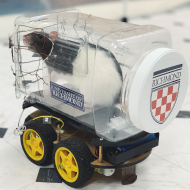
Finding may inform future mental health treatments
Researchers at the University of Richmond, Virginia, have taught rats how to drive little plastic cars.
In the study, published in the journal Behavioural Brain Research, rats were trained to drive in rectangular arenas. The rats who passed their test were rewarded with small pieces of cereal.
Researchers say their finding reveals rats’ brains are more flexible than previously thought, and could further inform scientists about treatment for mental health conditions, such as depression and anxiety.
Kelly Lambert, a professor of behavioural neuroscience at the University of Richmond, said: “We already knew that rodents could recognize objects, press bars, and find their way around mazes, but we wondered if rats could learn the more complex task of operating a moving vehicle.
“They learned to navigate the car in unique ways and engaged in steering patterns they had never used to eventually arrive at the reward.”
In the study, researchers fashioned a tiny car out of a clear plastic food container. The ‘car’ also had an aluminium floor and three copper bars for a steering wheel.
Researchers found that rats that took part in the study were more relaxed than they were before training. They assessed this by measuring the levels of two stress hormones in their blood - corticosterone, a marker of stress, and dehydroepiandrosterone (DHEA), which counteracts stress.
The researchers noted the ratio of DHEA to corticosterone in the rats’ droppings increased throughout their training. Interestingly, the rats had even higher DHEA levels (healthy hormone change) than in a previous study, in which they were driven around as passengers in a remote-controlled car.
“We concluded that the rats that actually learned to drive had a greater sense of control over their environment that was accompanied by increased DHEA — something like a rodent version of what we refer to as self-efficacy or agency in humans," said Lambert.
The researchers also found that rats housed in enriched environments learned the driving task, but rats housed in standard laboratory cages experienced problems with the task (i.e. they failed their 'driving test'.
"That means the complex living environment led to more behavioural flexibility and neuroplasticity," Lambert said. “This reminds us that our brains are constantly changing in response to our environments — and that we’re accountable for maintaining our brains moment-to-moment."



 The veterinary mental health charity Vetlife is inviting the veterinary community to join it for a sponsored cold-water dip.
The veterinary mental health charity Vetlife is inviting the veterinary community to join it for a sponsored cold-water dip.